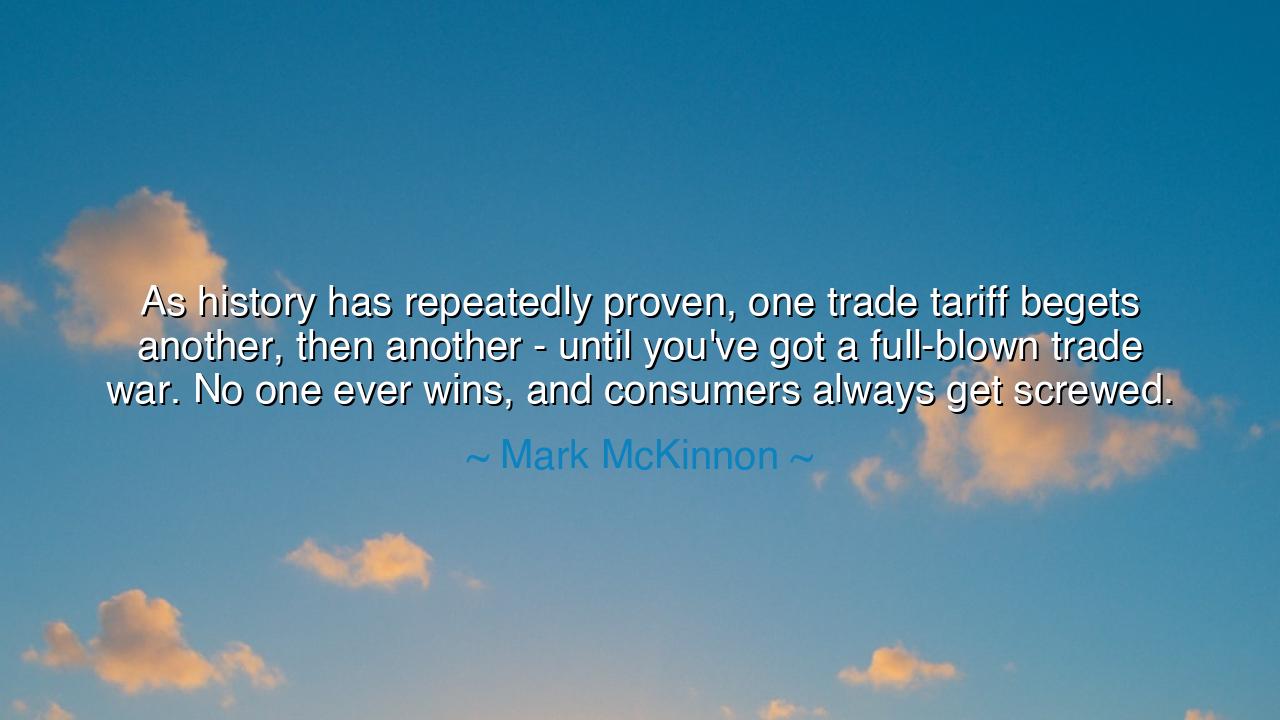
As history has repeatedly proven, one trade tariff begets
As history has repeatedly proven, one trade tariff begets another, then another - until you've got a full-blown trade war. No one ever wins, and consumers always get screwed.






“As history has repeatedly proven, one trade tariff begets another, then another — until you've got a full-blown trade war. No one ever wins, and consumers always get screwed.” — Thus spoke Mark McKinnon, a man of politics and reason, whose words carry both warning and lament. His tone is not of cynicism, but of weary wisdom born from the endless cycles of human folly. For in this statement lies a truth that echoes through the corridors of economic history: that pride and retaliation in commerce, like pride and retaliation in war, lead not to victory but to ruin. He reminds us that though nations believe they are defending themselves by raising barriers, they are, in truth, building walls around their own prosperity.
To say that “one trade tariff begets another” is to describe a law as old as human rivalry. When one nation closes its gates, another soon does the same. What begins as a single act of protection soon becomes a spiral of vengeance. And thus, the flow of goods and friendship that nourishes civilization begins to dry. In ancient times, trade was the lifeblood of peace — for where merchants met, understanding grew, and the exchange of wares became the exchange of ideas. But when envy or fear poisons this flow, when nations guard their markets like fortresses, trust withers, and the seeds of conflict are sown.
History, indeed, has repeatedly proven McKinnon’s words. Consider the tale of the Smoot-Hawley Tariff Act of 1930 — that tragic decree of economic nationalism passed by the United States at the height of the Great Depression. In its pride, the nation sought to shield its industries from the storms of foreign competition. But what followed was not salvation, but a storm far greater. Other countries, angered and afraid, raised their own barriers in reply. Within months, the world’s trade collapsed; exports fell, industries shrank, and hunger spread across continents. By the time the dust settled, millions had lost their livelihoods — and the world’s descent toward despair and war had quickened. Truly, as McKinnon said, no one ever wins.
For in a trade war, there are no victors, only losers disguised as patriots. The merchant suffers because his goods cannot cross borders. The farmer suffers because his harvest rots unsold. The craftsman suffers because the tools he once imported now lie beyond his reach. And above all, the consumer suffers, paying higher prices for fewer goods, trapped in a web spun by the pride of politicians. The leaders boast of strength, but it is the people — the mothers, the workers, the students — who bear the true cost. It is they who are, in McKinnon’s blunt truth, “screwed,” paying for the sins of vanity with the coin of hardship.
The ancients, too, knew the danger of such cycles. In the time of Athens and Sparta, alliances were shattered not by swords alone, but by trade restrictions and rivalries of wealth. What began as disputes over markets and ports soon ignited into full war — the Peloponnesian War — which left Greece divided, impoverished, and vulnerable to foreign conquest. Thus, the lesson is as old as civilization itself: economic arrogance is a prelude to destruction. For commerce, when guided by cooperation, builds civilizations; but when ruled by pride, it destroys them.
McKinnon’s words, though sharp, are not without hope. For if history proves that one tariff begets another, it also shows that peace can be restored through dialogue and interdependence. After the Second World War, when the world lay in ruins, nations chose not retaliation but reconciliation. They founded systems of trade — the GATT, the WTO, the European Common Market — to bind their fates together so that war, whether of weapons or of tariffs, might not return. The same forces that once divided them were turned toward unity. In this way, humanity learned — at least for a time — that cooperation is the only path to shared prosperity.
Let this be your lesson, then: beware the spirit of retaliation in any form — be it between nations, neighbors, or hearts. When one side raises walls, resist the urge to raise your own. Seek understanding instead of vengeance, dialogue instead of division. For in all conflicts, the cycle of escalation is easy to begin and hard to end. And though McKinnon spoke of nations and trade, his wisdom reaches deeper — into the soul of human interaction itself.
So remember, my listener: history does not favor the proud, but the wise. When disputes arise, whether in markets or in life, seek not to win at another’s loss, but to create balance. For only through balance comes abundance, and only through generosity does peace endure. Trade, like friendship, thrives on trust — and trust, once broken, is not easily rebuilt. Let us, then, build bridges, not tariffs; harmony, not hostility. For as Mark McKinnon so clearly warns, when the fires of pride are lit, it is always the people — the innocent, the unseen — who feel the heat.






AAdministratorAdministrator
Welcome, honored guests. Please leave a comment, we will respond soon